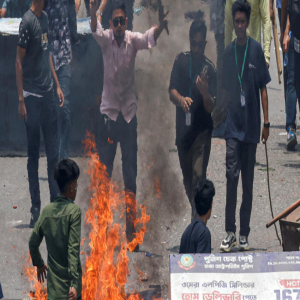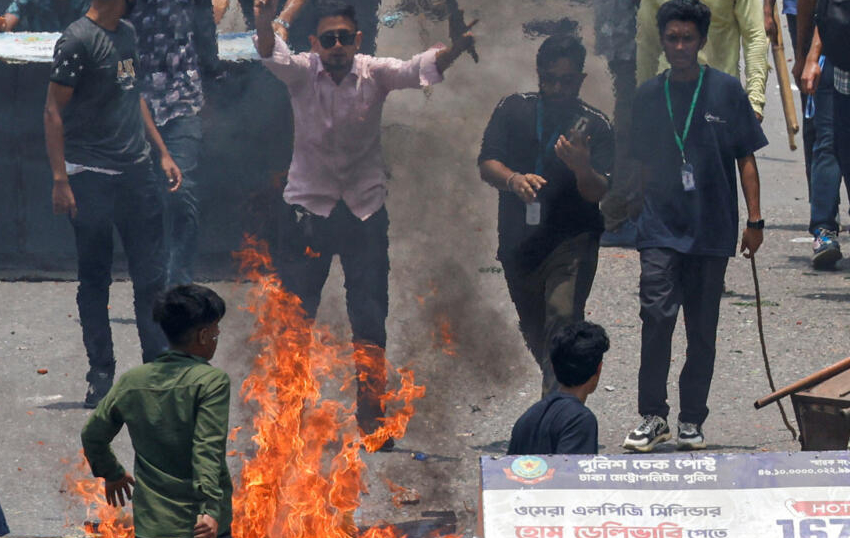
.png) John Dayal
John Dayal

"There's no doubt that India has come off the worst in what many are calling Bangladesh's Monsoon Revolution. Ajit Doval receiving Sheikh Hasina [in Delhi NCR] is just the sour icing on a stale cake", bitingly wrote Sudeep Chakravarti, the Director of the Dhaka-based Centre for South Asian Studies at the University of Liberal Arts, Bangladesh. As many other observers noted, he added that there is now "a desperate scramble in India to repair its relationship with Bangladesh—indeed, repair its relationship with Nepal, Sri Lanka, and Maldives, too."
Just under 600 persons have been killed in the two phases of violence in Bangladesh, a large number in the capital, Dhaka. Anywhere between 300 and 350 persons, mostly students, were killed in police firing on large groups of students protesting the reservation policy announced by the then-prime minister, Sheikh Hasina, without consultations with anyone. Students alleged the policy would benefit the children only of the Awami League, the ruling party.
Some 232 persons of those killed were policemen, members of the Awami League, and religious minorities, especially Hindus, who constitute 7 per cent of the total population of the country. The exact number of Hindus, Christians, and Buddhists killed or injured in the anti-government violence is still to be definitively known, but at least two Hindus are known to be dead, and over 200 temples and other religious structures across the country have been destroyed, media reports have said.
Although he is not designated prime minister, Nobel Laureate Muhammad Yunus has been sworn in as the chief adviser – presumably to President Mohammed Shahabuddin, who administered the oath of office to him and other advisers. His name was formally announced by army chief General Waker-Uz-Zaman, who was in control of the country after he facilitated the escape of the besieged Sheikh Hasina from her official residence.
While Yunus is a critic of Sheikh Hasina and was viciously targeted by her, President Shahabuddin and General Zaman were handpicked by Sheikh Hasina for their high office. The general won the trust of the agitating students when he told Sheikh Hasina that the army would not open fire on the agitators. This was about as close to a coup as could be, but it ensured a reasonably orderly transition to power. The combined writ of the chief adviser and the army have brought a semblance of peace.
Both have repeatedly stressed in their public statements that they are against any violence - by the student groups and political elements loyal to the opposition Bangladesh National Party of Begum Zia, as also by extreme Islamist elements of the Jamat-e Islami and right-wing groups who mixed with the mobs and are alleged to have been the key men who brought down the statues of Sheikh Hasina's father, Bangabandhu Sheikh Mujibur Rehman. The Bangabandhu, a Friend or Brother of the Bengalis, as he was affectionately known, led the freedom struggle in 1971 against Pakistan to create the new nation of Bangladesh. The Yunus interim government has expressed its sorrow at the attacks on the revered leader's statues and murals. But that was indicative of the anarchy in the country in the last fortnight.
In the chaos, India also lost whatever shred of prestige or persuasive moral and diplomatic stature it had that could have been used to ensure that no individual country would drift to such fatal internal convulsions as Bangladesh now saw and as Sri Lanka and Nepal had seen in civil wars in earlier decades.
Its own terrible civil liberties and human rights record has long toppled India from the moral high ground it possibly occupied in the first few decades after the liberation of Bangladesh. That birth of a new nation had seen a genocide, terrible rapine and the near annihilation of the intelligentsia.
It can be said that a swollen head and an insensitive foreign policy establishment then ensured that the goodwill would not last long. In quick succession, it ran aground in the Sri Lanka Civil War and later in the militant left armed groups' internal struggle for power after the fall of the monarchy. Its outreach shrank rapidly.
The last ten years have seen the arrogance of Indian foreign policy buttress and aggravate the arrogance of Sheikh Hasina's Awami League government. The reservation issue was the last straw, but there were many indications that the prime minister was courting disaster.
In just the period leading up to and following the controversial general elections in January 2024, the Hasina government indulged in voter suppression, intimidation, and rigging. Criticism was met by a brutal crackdown on opposition leaders and activists, particularly targeting members of the Bangladesh Nationalist Party (BNP) and Jamaat-e-Islami. Over 8,000 opposition leaders and supporters were arrested, many of whom were detained without trial under the Digital Security Act and other laws that effectively silenced dissent.
The Indian media would have found something familiar in the Hasina government's attitude towards the media. Journalists, bloggers, and social media activists who were critical of the government faced harassment, arrests, and, in some cases, forced disappearances. Over 200 cases were filed against journalists and activists during this period. Several media outlets were shut down or faced severe restrictions, leading to a significant chilling effect on free ex
Human rights organisations reported that the government used its security forces, particularly the Rapid Action Battalion (RAB), to carry out targeted killings of opposition figures and activists. In several high-profile cases, individuals were detained by security forces only to be found dead days or weeks later. The number of such incidents increased dramatically in the run-up to the elections, with at least 200 documented cases of enforced disappearances during this period.
Observers such as Sudeep Chakravarty say that the Bhartiya Janata Party and its power source, the Rashtriya Swayamsevak Sangh, played a major role in influencing Bangladesh's internal and foreign policy.
The India Foundation, a Sangh think tank with one of National Security Advisor Ajit Doval's sons as a senior member, held a major regional conference in Dhaka. The Indian External Affairs Ministry sponsored the event, which was also heavily funded by Bangladesh's foreign ministry.
The conference drew "leaders and fixers from India's resident and overseas saffron establishment," as Choudhury puts it, alongside government officials, politicians, career diplomats, and technocrats. The objective was to get Hasina and the country firmly and unofficially as part of India's effort to face, if not counter, China in the Asia-Pacific region. India is a member of the US-led Quadrilateral Security Initiative, which is in partnership with Japan and Australia.
The new Bangladesh would like to chalk out its own foreign policy without any string-pulling from New Delhi. It is not hostile towards China. India will have speedily and visibly tone down its Big Brother arrogance. The new Dhaka government will want major trade concessions, more grants, and aid to boost socio-economic programs. Above all, India will need to dispel fears of connectivity and trans-shipment, ensure equity in the imminent talks to share waters, fast-track a solution to the vexing issue of the sharing of Teesta River waters, cooperate for flood control and establish equitable riparian mechanisms, as indicated in the list that is being suggested for India.
This is, in a way, reminiscent of the Modi 240 government in New Delhi. The general election has knocked down the high pedestal from which, whip in hand, the prime minister was driving the country, its politics, civil society, and economy in what is often known as a Tughlaq style. Tughlaq was a medieval sultan in India who is most remembered for an abortive attempt to shift the capital of his empire from Delhi.
Bangladesh has 7 or 8 per cent Hindu, Christian and Buddhist minorities. Even after the 1971 genocide, these minorities continued to stay back in the country, though a trickle continued to migrate to India. But now, the trickle can become a flood if there is another wave of violence against the Hindus in particular. They are on tenterhooks. Modi had not visualised this eventuality when he, in another arrogant swipe at the Muslims within India, enacted a citizenship law which invites non-Muslims from Pakistan and Bangladesh to India.He will need humility to intercede with the new Dhaka government, especially on the very sensitive issue of ensuring the safety and security of the minorities in Bangladesh. A decent way to persuade neighbouring countries to be kind and generous to their Hindu, Christian and Buddhist populations is to be visibly kind to Muslims and Christians in India. Calling Muslims deemak (termites), aliens and infiltrators comes easily to the lips of Mr Modi and his home minister, Mr Amit Shah.
Muslims, who constitute approximately 14% of India's population, have increasingly found themselves at the receiving end of majoritarian policies and societal prejudice. The Citizenship Amendment Act (CAA) of 2019, coupled with the National Register of Citizens (NRC), has been widely criticised for being discriminatory against Muslims.
The CAA, which provides a pathway to citizenship for non-Muslim refugees from neighbouring countries, has been perceived as a direct assault on the secular fabric of the nation. In addition to legal challenges, Muslims in India face social ostracisation, lynching over allegations of cow slaughter, and discrimination in housing and employment.
Christians, who make up about 2.3% of the population, have also been targeted by Hindu nationalist groups. Attacks on churches, forced conversions, and anti-conversion laws in several states have raised concerns about religious freedom in the country. The narrative of "love jihad," a conspiracy theory that accuses Muslim men of marrying Hindu women to convert them to Islam, has also been used to justify violence against both minorities.
It would be strange and poetic justice if the compulsions of foreign policy in the neighbourhood ultimately "improved" the Modi 240 government and its internal record on human rights, civil liberties, and the rights of religious minorities.